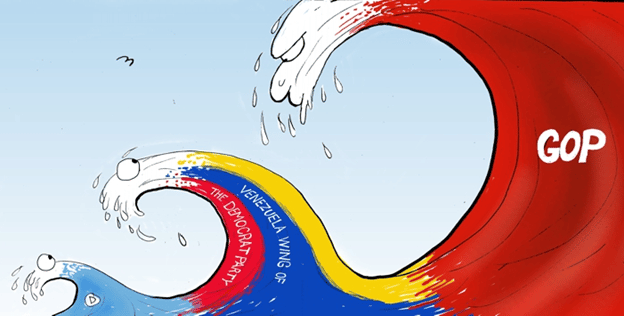Sept. 30, 2022
Permission to republish original opeds and cartoons granted.
Poll: Democrats’ 8-point lead in generic Congressional ballot evaporated in a month
By Robert Romano
Don’t look now, but Democrats’ 8-point lead in the generic Congressional ballot question from a month ago has evaporated in the latest Economist-YouGov poll of registered voters, which now shows the race for Congress tied, 44 percent to 44 percent on Sept. 24-27.
On Aug. 28-30, Democrats were leading Economist-YouGov’s generic ballot 46 percent to 38 percent. Leading the change in the state of the race is largely an apparent collapse of support for Democrats among younger adults, and a strengthening of support for Republicans among older adults.
Democrats were leading by 31 points among 30-44-year-olds on Aug. 28-30, 55 percent to 24 percent. That lead has shrunk to 12 points on Sept. 24-27 among 30-44-year-olds, 46 percent to 34 percent, in about a month.
Republicans also strengthened their lead among 45-64-year-olds, from 43 percent to 42 percent last month, to 49 percent to 42 percent this month. And their lead among seniors increased from 55 percent to 38 percent to 56 percent to 37 percent.
That’s all among registered voters. Recently, Economist-YouGov also added likely voters to the mix, and there, Republicans have opened up a 1-point lead, 47 percent to 46 percent.
Throughout the cycle, Republicans have been more energized than Democrats. A month ago, 77 percent of Trump supporters and 66 percent of Republicans said they were definitely voting, compared to 74 percent of Biden supporters and 64 percent of Democrats.
Now, 77 percent of Trump supporters and 66 percent of Democrats still say they are definitely voting, but only 71 percent of Biden supporters and 54 percent of Democrats say the same. Democratic enthusiasm has collapsed by 10 points in just a month. That’s pretty remarkable.
An undercurrent Democrats have been banking on is increased Democratic enthusiasm following the Supreme Court’s decision to overturn Roe v. Wade opening the door for states to further restrict abortions. In the July 2-July 5 Economist-YouGov poll, 34 percent said they approved of the Supreme Court’s decision and 54 percent disapproved, including 53 percent of independents who disapproved overall.
But by Aug. 28-30, disapproval of the decision had collapsed to 49 percent, with just 44 percent of independents disapproving of the decision, a 9-point collapse among independents. That’s significant.
Since then, Economist-YouGov has not reported public opinion on the Supreme Court decision, but considering how the Congressional generic ballot has moved, the answer must not be good for Democrats who were hoping it might save their skins in a year that otherwise favors the GOP.
So, these could be historical trends reasserting themselves that favor Republicans, the opposition party, in the Congressional midterm election cycle. In midterm elections dating back to 1906 through 2018, the party that occupied the White House lost seats in the House 27 out of 30 times, or 90 percent of the time, with losses averaging 31 seats. The exceptions were 1934, 1998 and 2002, when the incumbent party was able to pick up seats in the House.
In the Senate, comparatively, the incumbent party lost seats 21 out of 30 times, or 70 percent of the time, with losses averaging three seats in the Senate.
Now, polls are once again reflecting that likelihood as the month of September draws to a close. This is what usually happens in the midterm cycle. In a tug of war between fatigue versus anxiety, the opposition party that lost the White House in the prior election is anxious to reclaim power, and so are more enthusiastic than the incumbent party who just won the White House. So far, that appears to be holding up, but we’ll find out in a little more than a month. Stay tuned.
Robert Romano is the Vice President of Public Policy at Americans for Limited Government Foundation.
To view online: https://dailytorch.com/2022/09/poll-democrats-8-point-lead-in-generic-congressional-ballot-evaporated-in-a-month/
Cartoon: Joyless Weather
Video: Joe Biden’s Incapacity A Threat to the World? w/ A.F. Branco

To view online: https://www.youtube.com/watch?v=rNTeu5KIImM

Paul Sperry: Durham Prosecutes FBI Informants, While Protecting Their Handlers
By Paul Sperry
Since being named special counsel in October 2020, John Durham has investigated or indicted several unscrupulous anti-Trump informants. But he has spared the FBI agents who handled them, raising suspicions he's letting investigators off the hook in his waning investigation of misconduct in the Russiagate probe.
In recent court filings, Durham has portrayed the G-men as naive recipients of bad information, tricked into opening improper investigations targeting Donald Trump and obtaining invalid warrants to spy on one of his advisers.
But as the cases against the informants have gone to trial, defense lawyers have revealed evidence that cuts against that narrative. FBI investigators look less like guileless victims and more like willing partners in the fraudulent schemes Durham has brought to light.
Notwithstanding his reputation as a tough, intrepid prosecutor, Durham has made excuses for the misconduct of FBI agents, providing them a ready-made defense against any possible future prosecution, according to legal experts.
"Durham was supposed to clean up the FBI cesspool, but it doesn't look like he's going to be doing that," said Paul Kamenar, counsel to the National Legal and Policy Center, a Washington watchdog group. "He started with a bang and is ending with a whimper."
In the latest example, critics point to a flurry of pretrial motions in Durham's case against former FBI informant Igor Danchenko, the primary source for the false claims regarding Trump and Russia advanced by the opposition research paid for by Hillary Clinton's campaign known as the Steele dossier.
Next month, Danchenko faces charges he lied to FBI investigators multiple times about the sourcing of the information in the dossier, which the bureau used to secure wiretap warrants to spy on a former Trump campaign adviser. Relying on Danchenko's reporting, the FBI claimed that the adviser, Carter Page, was a Russian agent at the center of "a well-developed conspiracy of cooperation" between Trump and the Kremlin to steal the 2016 presidential election.
"The defendant was providing them with false information" as part of "a concerted effort to deceive the FBI," Durham alleged in a recent filing with the U.S. District Court in Alexandria, Va., where the trial is scheduled to be held Oct. 11.
Had agents known Danchenko made up the allegations, Durham asserted, they might have asked more questions about the dossier and not relied on it to swear out the ultra-invasive Foreign Intelligence Surveillance Act warrants to electronically monitor Page, a U.S. citizen who was never charged with a crime.
But Danchenko's legal team points out that he turned over an email to the FBI during a January 2017 meeting with agents and analysts that indicated a key dossier subsource may have been fictionalized. Stuart Sears, one of Danchenko's attorneys, argued earlier this month in a motion to dismiss the charges that investigators "essentially ignored" any concerns they may have had about Danchenko's sourcing, because they continued to renew the FISA warrants based upon it. Therefore, he argued, any lies his client allegedly told them were inconsequential, making them un-prosecutable under federal statutes requiring such false statements to have a "material" impact on a federal proceeding.
While Durham did not dispute the FBI's apparent complicity in the fraud, he waved it aside as immaterial to the case at hand. "The fact that the FBI apparently did not identify or address these inconsistencies is of no moment," he said in his filing.
At the same time, Durham acknowledged agents allowed the fabrications to contaminate their wiretap warrants – noting they were "an important part of the FISA applications targeting Carter Page." But he stopped short of blaming the FBI, even for incompetence. According to Durham, the nation's premiere law enforcement agency was misled by a serial liar and con man.
"He's painting it as though the FBI was duped when the FBI was more than willing to take the initiative and go after Trump," Kamenar said, adding that though Danchenko may have been a liar, he was a useful liar to FBI officials and others in the Justice Department who were pursuing Trump.
The special prosecutor's indifference to the FBI's role in the scandal is more remarkable in light of what Danchenko admitted in his January 2017 interviews with the FBI. He told investigators that much of what he reported to Steele was "word-of-mouth and hearsay," while some was cooked up from "conversation that [he] had with friends over beers," according to a declassified FBI summary of the interviews, which took place over three days. He confessed the most salacious allegations were made in "jest."
To view online: https://www.realclearinvestigations.com/articles/2022/09/29/durham_prosecutes_fbi_informants_while_protecting_their_handlers_856062.html




